商务英语谈判chapter One
商务英语谈判Chapter One--2
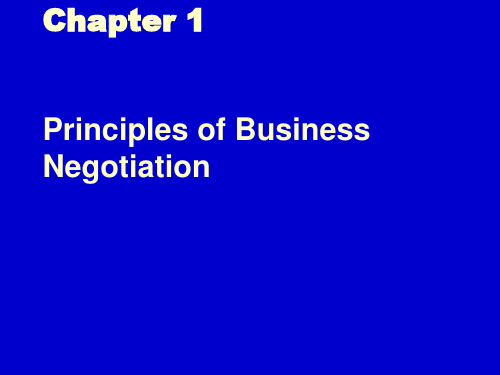
Principles of Business Negotiation
Principles of Collaborative Negotiation
Collaborative Negotiation
Principled Negotiation
Negotiation Skills Homework Analysis
If you can reach an agreement within your settlement range, it's a win!
Integrative Bargaining
Integrative bargaining refers to the potential for the parties' interests to be combined in ways that create joint value or enlarge the pie.
Focus on interests not positions Problem:
As Fisher and Ury explain, “Your position is something you have decided upon. Your interests are what caused you to so decide.”
Case Study
一次,IBM公司同一家大银行做一笔计算机 生意,双方为价格争执不下,银行拿另一家公司 来压IBM公司。在关键时刻,IBM公司的总经理向 银行的负责人问道:“阁下,您是想要和一个硬 件商人做生意?还是想找一个合作伙伴?” 对方 愣了一下,立即明白了他的意思,说道:“我想 找个合作伙伴。” “那么和你的新伙伴握手吧。” 随后两只大手握在一起,生意就此成交了。 What does the manager of IBM mean? Taking each other as friends not as adversaries.
国际商务英语谈判答案(全)

国际商务英语谈判答案(全)Keys to the exercisesChapter 1 Fundamentals of International Business Negotiation Communication Exercises1. Change the sentences from negative to positive.1) I want a job.2) I work hard.3) My job is terrific.4) This office is great.5) My co-workers are super.6) The Personnel Director is nice.7) My health is good.8) My attitude is positive.9) I make a good impression.10) I understand.2. Change or add to these sentences so that they do not just state what you want, but invite your negotiating partner’s opinion.a) Could we finish at five---if that’s all right with you?b) I hope you don’t mind if Miss Li sits in during the negotiation?c) Perhaps we could take a break now. Is that OK?d) Could we look at these three areas this morning?e) I would like to go through the written offer clause by clause, if that’s OK?f) Do you mind if I answer your questions at the end?3. What is meant by “negotiation”? How would you define “negotiation”?A nego tiation is a meeting in which both parties need each other’s agreementto reach a specific objective. It is the mechanism by which people trade things of value in a civilized manner. Negotiation depends on communication.It occurs between individuals acting either for themselves or as representatives of organized groups. Negotiations are very much part of working and home life. Negotiations could be either internal or external, long or short, formal or informal. The goal of negotiation is not to win but to succeed. The mechanism of successful negotiation is collaboration.In negotiations, both parties should know----why they negotiate----who they negotiate with----what they negotiate about----where they negotiate----when they negotiate----how they negotiate1) T 2) T 3) T 4) F (Everything is negotiable.)5) F (bargaining stage)6) F ( Do not often. Sometimes they will follow the sequence n one aspect of thedeal and then start all over again on a second aspect.)7) T8) F (May not. Because either side may be wiling to say what it thinks or takea position and stick to it )9) T 10)Negotiation skills1.What determines a success in negotiation? Success in negotiation is when the parties to the negotiation reach an agreement to which they are both committed and which they will implement in full.committed [] v.----尽责的implement [] v.----to put into practical effect; carry out 使生效;执行2. What are the elements of a successful negotiation process?There are seven basic elements that should be considered when analyzing the negotiation process:a.The relationship among the parties.b.The parties' interests -- why they need to reach their stated objectivesc.An understanding of the choices available if the parties cannot reachagreement, often called their BATNA -- Best Alternative To a Negotiated Agreementd.Creativity which will expand the bargaining choices among which theparties can choose to reach agreemente.Fairness -- a person who negotiates unfairly may be able to force anagreement, but the 'forced' party will be reluctant to fulfill their share of the agreementf.Whether commitment has been reached. Will the parties each feelcommitted to doing what they have agreed? Is each party capable of fulfilling their share of the deal?g.Negotiation is all about communicating information. If one party knowseverything then why do they need to negotiate with anyone else?And the foundation of good negotiation is preparation. Be prepared and the negotiation will bring a result that really works. If well prepared you areless vulnerable to surprise, and that increases the likelihood you'll be happy with the result.vulnerable [] adj.----易受攻击的, 易受...的攻击3. Your client comes into your office and is exceedingly grumpy and difficult to talk to. How do you approach your client so as to make your meeting as productive as possible?Answer: (e)When the client is grumpy, their emotions will inevitably cloud their judgment and make it difficult to interact with them on substantive matters.At the same time, if they are experiencing anger, it is important to ensure them that we understand that they are upset. By acknowledging the client's anger and offering our assistance, the client will feel as though we are on the "same side" and treat us as friends and continue to direct their anger elsewhere- allowing us to focus on the substantive issues.substantive [] adj.----of or relating to the essence 实质的Chapter 2 Proper Behaviors in International Business Negotiation Communication Skills1. What would you say if…a.Thank you./No, after you.b.Thanks. I’ll need it.c.Thanks. That’s very kind.d.Thanks for coming all the way.e.Thanks for helping. That was very kind of you.f. Thank you for thinking of me, but I’m afraid I can’t take it.2. Answer the following questions.(1) Only about half of what he or she heard(2) Not only does note taking force you to listen carefully, but it alsopsychologically throws the speaker off the balance when he or she sees you nodding and furiously writing away and having a record of all the facts and basically everything said. A further benefit of note taking is that you have the perfect excuse to avoid eye contact if you are afraid to reveal your reactions to someone’s proposals(3) Questions appear to be able to be divided into five basic functions:①Cause attention.②Get information.③Give information.④Start thinking.⑤Bring to conclusion.(4) There are two ways to assure a high degree of reliability for answers toyour questions. One way is to lay the foundation for asking them. The second is through the use of the tactic called “bipolar questioning.”(5) A firm handshake gives the impression of quiet confidence and says thatthis person is glad to meet you.3. Choose the best answer.(1) D (2) C (3) B (4) A (5) (6) D (7) B (8) C (9) A (10)A4. Translate the following into English.(1) There’s a great demand for our new product.(2) This product has good prospects.(3) We need to talk about the basic terms of the transaction.(4) If your prices are reasonable and the quality is satisfactory, we shallplace substantial orders with you.(5) It’s unwise for both of us to insist on his own price. Can we each makesome concession?(6) If you cannot reduce your price, we’d rather call the whole de al off.(7) If you want to expand your business in this market, you have to takeflexible ways in adopting payment terms.(8) We regret that we cannot accept your demand for direct shipment.(9) This product has many advantages compared to other competing products.(10)I’m very glad that we have finally come to an agreement. We’ll go on toother terms and conditions tomorrow. Is it all right with you?5. True or false.(1) F (2) T (3) F (4) T (5) F (6) T (7) F (8) F (9) F (10) T Negotiation Skills1. The person you are negotiating with continually repeats the same argument despite the fact that you have given them a number of counterarguments. What do youdo to move the negotiation forward? Answer: (a)One of the most powerful tools in negotiation is how to listen to what the other party is saying. Very often, we are too focused on the points we are trying to get across to listen to what our counterparts are trying to say.If people keep repeating themselves, they are subconsciously sending a signal that they feel what they are saying is important. And they want us to acknowledge that we have heard and understand them.Accordingly, the best thing to do in this situation is to rephrase what they keep repeating and ask them if we have accurately restated their point. Only when they feel as though they have been heard will they be able to listen to usEffective listening involves much more than simply hearing and understanding what the counterpart is saying. Effective listening isa set of tools and techniques which expertnegotiators use to gain control of the negotiation and turn it to their advantage.2. What are the key communication skills used in negotiation?The key communication skill in negotiation is to listen. There's an old saying: God gave us one mouth and two ears, and we should use them in that ratio.Obviously when we are listening, we need to be listening for useful information. Thus it is very important to plan ahead, thinking about what we can learn that will help us decide what approach to take and to learn about what appeals to the parties with whom we are negotiating. So think about the questions you're going to ask; the result should reward your listening with real problem-solving information.Chapter 3 Choosing the Negotiation TeamCommunication Exercises1. What is the more indirect question or statement behind the following sentences?a. I’m not entirely convinced by these forecasts.b.We’d like to know something about your planning.c.I’d be interested to hear a bit abou t payment.d.Your costs could cause one or two problems.e.Perhaps we could talk a little bit about figures.f.That figure looks a little on the high side.g.Delivery is an area which we’d like to explore a little further with you.h.I’d like to know more about your management structure.1.Write the name of the position in the blank.1) CEO/the president2) Assistant Manager, Europe3) Purchasing Clerk4) Personnel Assistant5) Vice-President, Administration3. (omitted)4. (omitted)5. Fill in the blanks1)maximum2) observers; advisers; speaking; training6. Translate the following into English1)Negotiation is a team sport.2)The negotiator’s function is to negotiate, while the functional specialists provide specialist advice or information.3) The team leader is the person who generates enthusiasm in his team tomaintains the morale under all conditions.4) The team members must learn that the opponent and its representativesare adversaries although they may be friendly.5)I’m afraid you are not in our ballpark.6) Excuse me, but it seems to me we’re giving up too much in this case.7)That’s to o great a financial burden for us.8) 10% is beyond my negotiating limit.9)If you can guarantee that on paper, I think we can discuss this further.10)Could you explain what you mean by that?7. True or false1). F 2). T 3). T 4). F (maximize) 5). T 6). F (can’t)7). F (both sides) 8). T 9). T 10). F(There is no need to )Negotiation skills1. What do you think are the personal qualities of a good negotiator?A good negotiator needs to be:1)A good listener2)Open-minded3)Willing to do the homework to determine her/his interests,objectives, and alternatives4)Well-prepared5)Creative6)Able to merge what he knows about his own interests andresources with the interests and resources of his negotiationpartner7)Someone who is always learning from experience, from otherpeople and from historymerge [] v. ----to combine or unite 使合并或结合2. How to be a cool negotiator?Acting cool is a good part of successful negotiation. But one needs to make sure it is not just an act. The 'coolness' needed for successfulnegotiation really means keeping a cool analytical head. If there is anychance one should prepare ahead of time: what do I want and why do Iwant it? What do they want and why do they want what they want?During the process, one should find ways to take a step back from thediscussion and look at what is going on with that same cool head. 'Why did he say that? What arguments or tactics are being used?3. How to control anger for effective negotiating?When tempted to get angry, remember to check whether or not it is yourturn. If it is someone else's turn to get angry, sit there and take it byreminding you how wonderful you are to be in such control of youremotions.One fundamental rule is: only one person can be angry at a time. Don't let the situation escalate, civility will slip away awfully quickly and there willbe a very tough time healing the relationship or solving the initial issue. civility [] n. ----a courteous act or utterance有礼貌的举止或表达4. What are the advantages and disadvantages of team negotiations?Negotiating as part of a team requires very careful preparation. The biggest danger in team negotiation is that your counterparts will see or hear thatyou and your colleagues don't agree with each other. If they can finddifferences, they may spot opportunities to drive wedges between your team members.wedge [] n.----something that intrudes and causes division or disruption侵入引起分裂的东西Teams can work together ahead of time on strategy: who is going to be the spokesperson on which issues? What information do we need and who isgoing to ask the relevant questions? Who can communicate what decisions to the 'other side'? What members of the team are the experts on technical matters, business matters, etc.?But even if a group of colleagues work hard at developing a commonlyagreed strategy you will find that, there is still a risk that someone will say something out of turn or which is not part of his role. They need to explore how to cope with such problems during the actual negotiation.Individual negotiations have certain other advantages: the negotiator can present him/herself as the decision-maker or as the spokesperson for their company or colleagues. This gives the individual negotiator considerableflexibility that may not be available in team negotiation situations.Chapter 4 Preparing for NegotiationCommunication Exercises1. What would you say in these situations?1) Mrs Zhang, I’d like you to meet Tr acy Morris. She’s our new sales clerk.2) Hello, Kathy. Nice to meet you.3) That’s right. Yes, we once worked together in.4) I’m terribly sorry. I’ve forgotten your name.5) Yes, good morning. My name is … I’ve got an appointment with…6) Did you have a good journ ey? It’s very nice of you to come all this way.7) Would you like a coffee? Or Would you like something to drink?8) Good heavens, is that the time? I didn’t realize it was so late. I really mustbe going now.2. Make these sentences more concise1) He’s an assistant in Personnel.2) She’s the Vice-President in Sales and Marketing.3) He’s the Assistant Manager in Domestic Sales.4) She’s the Manager in International Sales.5) He’s an accountant in Accounting.3. Combine these sentences as concise as possible1) She is a clerk in Purchasing at ABC Company.2) He’s a salesman in the Asian Pacific Division at Sun Computer Company.3) She’s the Manager of Domestic Sales at Legend Group.4) He’s a secretary in Personnel at Huatian Hotel.5) She’s the Vice-President of Administration at Three-One Steel.4. Do you think all negotiations need an agenda? Who should be responsible for controlling a negotiation?Informal negotiations don’t need an agenda. In some cases, you are negotiating just one point. An agenda is often best negotiated rather than imposed at the start of a meeting. Usually the host company should be responsible for controlling the negotiation.5. How can you prepare effectively for a negotiation? What issues do you need to discuss beforehand?The essential preparation areas are firstly to ensure that everyone in the team is clear what the objectives of the negotiation are. The objectives include:What is the best we can get?What’s the worst we can get?What is our bottom line?And secondly, to establish the role that each individual is expected to play in achieving those objectives. Namely:Who is responsible for different stages of the negotiation?What special skills/knowledge do individual members of the team have?What do we know about the other team?It is important to discuss strategies beforehand and to decide on the approach the team is going to take which include:What are the main areas of negotiation?What are likely to be the sticking points?What is the best order to discuss these points?What concessions can we give to achieve our main aim?It is also essential to discuss the communicative ways like:how we are going to maintain positive communication,who is taking notes or minutes andwho is going to ask questions and so on.6. Put the following into English1)Please take a look at the itinerary we prepared for you, and let me know if there’s anything inappropriate, please let me know.2)We are holding a banquet here tonight in honor of our friends coming from the other side of the Pacific Ocean.3)I believe that through our joint efforts, our corporation can be satisfactory and successful.4)Let’s come to the point, the purpose of my current visit here is to explore the possibility of doing barter trade with you.5)T he contract will come into force from May 10, you can’t go back on your words then.6)We always fulfill our promise.7)Owing to our old relationship, we hold our offer valid for one other week, after which our price would probably be raised.8)I'll do my best; and please, try your best too.9)Your price is too high. It’s hard for us to accept.10)All our products are high-grade commodities; naturally the prices are different.7. True or false1) T 2) F 3) F 4) T 5) T 6) F (unwise) 7) T 8) T9) F (fluid) 10) T 11) F(round table)12) FNegotiation Skills1. In your opinion, what are the benefits of considering your own and others’ outcomes in negotiation preparation?The benefit of considering the outcomes for ourselves and others gives us an initial sense of 'what' people are looking for.It is far more important to look to the interests of the others. The question to ask is why do people want the outcome they are pursuing. It is easy to think of desirable outcomes in terms of money, which is in many cases what people want.When thinking ahead of time about others’ interests, we are making a series of assumptions. We should use the negotiation process to pursue the fundamental asset of negotiation, which is information. Are the assumptions accurate? If the interests assumed are 'out there', the answers we derive should yield a clearer understanding of the actual interests that motivate the parties and will lead to a successful agreement.2. How to measure a negotiator’s strengths and w eaknesses?In general, measuring a negotiator's strengths and weaknesses can involvea multiplicity of elements, but the most important are the following:1) A negotiator's relative strength is determined by the quality and extent of his preparation. The better one understand his/her interests and the better he/she understands the interests of other parties, the greater the chance he/she will be able to reach an elegant solution which leaves the parties feeling as if each has achieved the major portion of their goals.2) A negotiator's relative strength can be measured by whether people walk away thinking they would be pleased to negotiate with him again. That is to say----if people leave a negotiation thinking they never want to see him/her again, then he/she is a poor negotiator.3) A negotiator needs to understand that different issues should be treatedas of different priorities in different negotiations. Sometimes the relationship is most important; other times creativity is the measure of how well one negotiates. It is always true that good communication is fundamental of a negotiator's strength. A good negotiator makes his points clearly understood by other parties. A better negotiator makes understanding other parties his top priority.multiplicity n. ----the state of being various or manifold多种多样多方面或者多种形式Chapter 5 The Bargaining ProcessCommunication Exercises1. In the business world, everyone is very busy. Business calls are concise and “to the point.” Remember to be positive. Which is the b est expression?1) b 2) a 3) a2. Make proposals about the following:1) I think we should cut the training budget by five per cent.2) I suggest we aim for a two per cent rise in productivity.3) How about going for a meal after work?4)Why don’t w e go to the National Forest Park this year for the companyexcursion?5) I advise you to reduce production costs.6) I propose that we shorten working hours by two and a half hours per week.3. Use the conditional constructions (if…or unless…) to exert pr essure in the following situations.1) I’m afraid we’ll have to cancel the contract unless you reduce your fees.2) We’ll have to choose another supplier if you can’t pay us on time.3) That looks like the end of the negotiation, unless you can make a concession.4) I’m afraid you’ll lose your job unless you work harder.5) If you can’t offer me a better working condition than this, I’ll leave thecompany.6) I’ll accept the new job only if I get a higher pay.7) Unless you order 10,000 pieces of this product immedia tely, you won’tget a quantity discount.4. Once positions have been established in a negotiation, a process of making and responding to proposals usually follows. Which side (the customer or supplier) should start the process? What are the advantages of going first and second?The supplier will usually be expected to start this process the advantage is then given to the customer who doesn’t have t show his hand until he first hears what the supplier is proposing. On the other hand, making a proposal first may set the parameters for discussion and it could be an advantage if you want the negotiation to go in a certain direction.5. What can cause negotiations to fail? How important is it to maintain a positive tone throughout the meeting?Negotiations can fail for a variety of reasons:competitors offer a better deal;problems seem too difficult to solve;personalities clash;negotiating styles clash.Most negotiations will encounter difficult problems. There is a much greater chance that solutions will be found if both parties keep sight of the main objectives and maintain a positive tone.6. Fill in the blanks1). Assess,differences,strengths,next round;2). Fluid,escape routes,time breaks3).Bargaining to our advantage, the skilled negotiator will:a) outsetb) situationc) roundd) satisfactione) Bluff, brinkmanshipf) parallelg) impassesh) written, equal satisfaction7. Put the following into English1) I understand perfectly.2) Let's compromise.3) That's a smart decision.4) I expect to be compensated.5).The longer we wait, the less likely we will come up with anything.6) I'll be expecting your call.7) I'd like to get the ball rolling by talking about prices8) I know your research costs are high, but what I'd like is a 25% discount.9) We'd need a guarantee of future business, not just a promise.10) If you can guarantee that on paper, I think we can discuss this further.6.True or false1). F 2) T 3) F (positive tone) 4) T 5) T6) F (without comment)7) T 8) F (more ) 9) F (high) 10) TNegotiation Skills1. You are negotiating a major purchase, and the sales agent suggests a ridiculously high price which is far above your anticipated purchase price. How do you address the agent in order to get the best price?(b) and (d)The sales agent is trying to get started on the traditional positional bargaining philosophy of "start high, counter low and end up in the middle." In order to counter their attempts at positional bargaining, we should begin by asking them what the basis for their initial price was. This tactic will draw attention away from the initial price and create a focus on the criteria for determining a fair price. Next, we should suggest a price of our own, prove the offer with appropriate criteria and stick to our offer.2. Do you think it’s a good idea to raise the critical issue early in the negotiation? How would you handle the aggressive position immediately adopted by others?Most negotiators start by identifying the common ground. In other words, the points which both sides agreed on. Then have a firm basis to discuss problem areas. It is important that our team do not show too strong an emotional response to the other party’s aggression. Because they will see this as a weakness.3. How to deal with those who say " Our prices are set, we do not bargain "?Businesses were created to meet a perceived need in the marketplace.There are people who fear that if they negotiate, other parties will take advantage of them. This sort of thinking is the result of the belief that negotiation is a competitive process, and only one side can win.The Internet has created a variety of auction choices; many other companies always guarantee the lowest price. So price competition is far from dead. It is simply a matter of people’s choice. If you want to attempt to bargain for a better deal, don't do business with no-negotiation companies.Chapter 6 Closing the NegotiationCommunication Exercises1. A positive comment makes people comfortable and ready to listen. Rewrite these sentences.1) Thanks for your understanding. I really appreciate it.2) Thanks for meeting me at the airport. I really appreciate it.3) Thanks for coming early. I really appreciate it.4) Thanks for working overtime. I really appreciate it.5) Thanks for your cooperation. I really appreciate it.2. A polite way to correct someone is to make the correction impersonal. Try not to use the word you. Which is a more polite correction?1) b 2)b 3) b 4) b 5) b 6) a 7) b 8) a3. Look at the expressions below. Which of them would you use to express each of these ideas in negotiating?What would you say in negotiating…if you’ve not understood an explanation? (10)when you want to complain indirectly to someone? (7)if you do not want to accept the advice someone is giving you? (5)when you want to tell someone something? (1)when you wish to agree with someone? (2)when someone you already know is introduced to you? (6)if you want to interrupt someone? (8)when it’s unlikely that you can do something? (3)when you would like a person to do something for you? (9)when you want to give someone some information? (4)4. Make these statements into proposals and suggestions. Be inclusive---use we rather than I. Try to word your sentences so that they encourage feedback.a. Let’s start by looking at the sales figures.b. Perhaps we should identify who our main competitors are first.c. Wouldn’t you agree that timing is essential?d. We think the main problem is the security system. Would you agree?e. Shall we discuss delivery issues at the end?5. Match each underlined expression (a-d) with its meaning from the expressions below and use the appropriate form of one of the expressions to complete the sentences(e-h).a. reduce our pricesb. a bargaining zonec. contingency pland. a tough negotiatore. room to manoeuvref. knock us downg. drives a hard bargainh. fall-back position6. What should happen at the end of a negotiation? What issues need to be agreed on before closing the meeting?It is important to round off a negotiation well, so that nothing remains ambiguous. Before closing the negotiation, the participants need to confirm what exactly has been achieved. They need to agree on future follow-up action and, if possible, set a date for the next or future meetings.7. What steps do you go through to close a negotiation effectively?To close a negotiation effectively we should do the following steps:1) Summarizing---summarize issues discussed---confirm objectives attained---state areas where you have yet to reach agreement or where further discussion is needed2) Follow-up action---delegate responsibility for follow-up action and set time-scale---minute or document decisions3) Departing---confirm arrangements for next meeting (if there is to be one)---chairperson thanks participants for coming8.Fill in the blanksunsuccessful, close, maximum, enough, agenda .9. Put the following sentences into English1)I think we have discussed most of the key issues today.2) That takes care of business for today.3) We can work out the detail next time.4) We have done a lot.5) It's party time.6) If there are still unanswered questions, I will be happy to help.7) I think we should meet again.8) Is a week too early to meet again?。
商务英语谈判情景对话(5篇)

商务英语谈判情景对话(5篇)商务英语谈判篇一Business NegotiationA: The seller Miss su representingKai ya Chocolate Manufacturing Co.LtdB: The buyer Mr.zhou representing zhong shang supermarket.A: Good morning, Mr.Zhou.Glad to meet you.B: Good morning, Miss su.It’s very nice to see you in person.A: How are things going?B: Everything is nice.A: So, what’s the topic of today’s meeting?B: Ok, after the last talk, we appreciate you price very let’s talk about the terms of payment.Would you accept D/P? I hope it will be acceptable to you.A: The terms of payment we usually adopt are sight L/C.B: But I think it would be beneficial to both of us to adopt more flexible payment terms such as D/P term.A: Payment by L/C is our usual practice of doing business with all customers for such commodities.I’m sorry we can’t accept D/P terms.B: As for regular orders in future, couldn’t you agree to D/P?A: Sure.After several smooth transactions, we can try D/P terms.B: Well, as for shipment, the soon the better.A: Yes, shipment is to be made in April, not allowing partial shipment.B: can you make it earlier? May be in March, our customer is eager for them.A: All right.Let me have a check, oh!There are some steam vessels available to your port, so we can make it in March.B: Good!By the way, when can I expect to sign the S/C?A: Mr.Zhou, would it be convenient for you to come again tomorrow morning.I’ll get the S/C ready tomorrow for your signature.B: That’s fine.See you Su.A: See you and thanks for coming, Mr.Zhou.常用商务英语谈判对话开场介绍篇二常用商务英语谈判对话:开场介绍篇编辑:Smart(1)A: I don’t believe we’ve met.B: No, I don’t think we have.A: My name is Chen Sung-lim.B: How do you do? My name is Fred Smith.A: 我们以前没有见过吧?B:我想没有。
顾渝-商务英语谈判-1
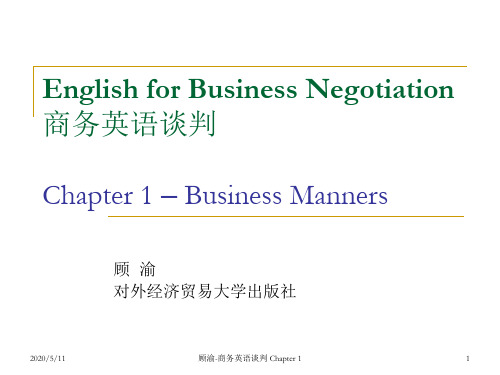
2015-4-13
顾渝-商务英语谈判 Chapter 1
5
1.1 Before You Begin
6. 7.
8. 9.
10.
What do you think is the “right” amount of eye contact? Can you give an example to show the written rule for dress code or the informal ideas of what is acceptable to wear? Why are “controversial subjects” not suitable for small talk? How to understand “The relationship with a person determines the kind of language you use. This relationship may even affect what you say when you meet people”? What communication methods are used in the following sentences? What effects have been brought by such methods? • We close the café every night at 11:30 so that we can go home. • The café will remain open until 11:30 P.M. for the convenience of our customer.
2015-4-13
顾渝-商务英语谈判 Chapter 1
商务英语谈判chapter-One--1市公开课获奖课件省名师示范课获奖课件

Stakes
Stakes are the values that may be gained or lost, and costs that may be incurred or avoided.
Disputable interests No free lunch (one for one) Comparison of benefits Current interest vs. long-term interest
白远. 国际商务谈判---理论案例分析与实践. 北京:中国人民大 学出版社,2023. (参照教材)
安排:
1. 教材共七章,每章结束后布置书面作业一份。 2. 每章中小节后旳练习要求学生作为课后练习,自觉完毕。 3. 每位同学准备一种谈判案例并进行技巧分析,在每次上课时
进行课堂演示。
成绩构成
So information is an essential element in the success of negotiation.
Case Two
世界著名旳迪斯尼企业在20世纪90年代遇到这么
一件事情。企业耗资50亿美元在巴黎附近兴建旳主题公
园准备于1992年4月12日开张,工程结束前,建筑承包
Conflict occurs when two or more people compete over limited resources.
What is conflict? What are the features of conflict?
Conflict
A Conflict is a dispute, disagreement or argument between two or more interdependent parties who have different and common interest.
商务英语谈判课件余慕鸿chapter1

商务英语谈判课件余慕鸿chapter1Chapter 1: Introduction to Business Negotiation1.1 Definition of Business Negotiation- Business negotiation refers to the process of reaching an agreement or settlement through discussions between two or more parties.- It involves a series of interactions, give-and-take, and compromise to find a mutually acceptable solution.1.2 Importance of Business Negotiation- Business negotiation is crucial for achieving successful outcomes in various business scenarios such as sales, partnerships, contracts, and mergers.- It helps in resolving conflicts, addressing differences, and building long-term relationships with stakeholders.1.3 Key Skills for Effective Business Negotiation1. Active Listening: Paying attention to the other party's needs and concerns and understanding their perspective.2. Communication: Clearly expressing your own needs, interests, and expectations.3. Problem-solving: Identifying common goals and finding creative solutions that satisfy both parties.4. Flexibility: Being open to alternative solutions and willing to compromise.5. Emotional Intelligence: Understanding and managing your own emotions as well as understanding the emotions of the other party.6. Preparation: Conducting thorough research, planning, and strategy development before entering the negotiation.7. Patience: Remaining calm and composed during tense moments, and avoiding impulsive decisions.8. Negotiation Ethics: Upholding ethical standards and values such as honesty, fairness, and transparency in the negotiation process. 1.4 Different Approaches to Business Negotiation1. Competitive Approach: Focusing on one's own interests and trying to maximize benefits at the expense of the other party. This approach can lead to win-lose outcomes.2. Cooperative Approach: Collaborating with the other party to find mutually beneficial solutions. This approach aims for win-win outcomes.3. Integrative Approach: Combining elements of both competitive and cooperative approaches. It involves creating value through trade-offs and expanding the resources available to both parties. 1.5 Common Challenges in Business Negotiation1. Different Interests: Parties may have conflicting interests and priorities.2. Communication Barriers: Language barriers, cultural differences, and misinterpretations can lead to misunderstandings.3. Power Imbalance: One party may have more power or leverage in the negotiation, creating an uneven playing field.4. Emotions and Personality: Emotional reactions, egos, and personal conflicts can hinder the negotiation process.5. Time Pressure: Limited timeframes and deadlines can add pressure and impact decision-making.1.6 Strategies for Successful Business Negotiation1. Preparation: Gather relevant information, understand the otherparty's position, and define your own objectives.2. Building Rapport: Establish a positive relationship with the other party through trust, respect, and active listening.3. Finding Common Ground: Identify shared interests and goals to create a foundation for collaboration.4. Effective Communication: Clearly and concisely communicate your needs, preferences, and proposed solutions.5. Managing Emotions: Stay calm and composed, acknowledge emotions, and find constructive ways to address them.6. Flexibility: Be open to compromises and explore alternative options to reach a mutually satisfactory agreement.7. Closing the Deal: Ensure that the negotiated agreement is documented and all parties understand and accept the terms. References:- Lewicki, R. J., Saunders, D. M., & Barry, B. (2010). Negotiation: Readings, Exercises, and Cases.- Shell, G. R. (2006). Bargaining for advantage: Negotiation strategies for reasonable people. Penguin.- Salacuse, J. W. (2007). The global negotiator: Making, managing and mending deals around the world in the twenty-first century. Macmillan.。
商务谈判unit1

• Win-lose: I win, you lose • Win-win: Opportunities for both parties to gain
9 1-9
Interdependence
– Negotiators must be versatile in their comfort and use of both major strategic approaches
– Negotiator perceptions of situations tend to be biased toward seeing problems as more distributive/competitive than they really are
– Zero-sum or distributive – one winner – Non-zero-sum or integrative – mutual gains situation
11 1-11
Alternatives Shape Interdependence
• Evaluating interdependence depends heavily on the alternatives to working together
could attain on his or her own • To resolve a problem or dispute between
the parties
4 1-4
Approach to the Subject
Most people think bargaining and negotiation mean the same thing; however, we will be distinctive about the way we use these two words:
谈判商务英语

谈判商务英语Chapter 1:Dialogue one ,this dialogue is between jack who is pretty good at playing chess and his friend, a nextdoor neighbour, Mary, a member of the school chess club. Jack promised to play chess with Mary on Monday after school to help her get ready for a competition. if she did the dishes for him on Sunday. Marry did the dishes and now, Jack means to keep his promises.Jack: I'm going to the park to play baseball with the guys.Mary: But you promised to play chess with me this afternoon.Jack: Yeah, but that was before the guys ask me to join the team.Mary: So what?Jack:You know how much I want to be on the team ,and now there is an opening for me.If I don't go to practise today.They'll get someone else and I'll miss my chance.Mary:I don't care about baseball.You know I need to practice for the chess championship and you promised to help with me if I washed the dishes for you last Sunday, and I did.Jack:I know,and I will.Mary:When?Jack:After baseball practice.Mary:And then ,it'll be dinner time,then homework,and then your TVshow is on.You are going to break your promise.Jack:No,I won't.I'm going to skip TV tonight and work on your chess game with you if that's ok with you.Mary:Well,I'd rather do it the way we set up.But if you promiseto give me your best game,it's ok with me.Jack:No problem,I'll play as hard as I can and give you an extra game to say thanks.Let's listen again.Jack:I'm going to the park to play baseball with the guys.Mary:But you promised to play chess with me this afternoon.Jack:Yeah,but that was before the guys ask me to join the team.Mary:So what?Jack:You know how much I want to be on the team and now there is an opening for me.If I don't go to practice today.They'll get someone else and I'll miss my chance.Mary:I don't care about baseball.You know I need to practice for the chess championship and you promised to help with me if I washed the dishes for you last Sunday, and I did.Jack:I know,and I will.Mary:When?Jack:After baseball practice.Mary:And then ,it'll be dinner time,then homework,and then your TVshow is on.You are going to break your promise.Jack:No,I won't.I'm going to skip TV tonight and work on your chess game with you if that's ok with you.Mary:Well,I'd rather do it the way we set up.But if you promiseto give me your best game,it's ok with me.Jack:No problem,I'll play as hard as I can nad give you an extra game to say thanksDialog 2Jack and Mary are now grown up and dating.Their friendship is as strong as ever there's strong bond between them,so their dialog is relaxed and flows pretty freely.It's more like a married coupls than young dating to get to know each other.Mary:Let's have seafood tonight and then go see the new movie at Mall Cinema.Betsy told me it's a beautiful love story and I shouldn't miss it.Jack:Oh,Goodness, please not again.That's what we did last week.Mary:No,we didn'st week we went to see that movie about a man's struggle against mental illness.Jack:Right,it was a chick flick,just like this one,so what's the difference?没错,那是你们女生看的电影,这部也一样.哪里不同?Besides,this is the last week for the third movie in Destroyer series and I want to see that on a big screen.再说,《毁灭者》第三集这礼拜就要下档了,我希望能在大银幕上看这部电影。
教学课件 国际商务英语谈判--蒋磊
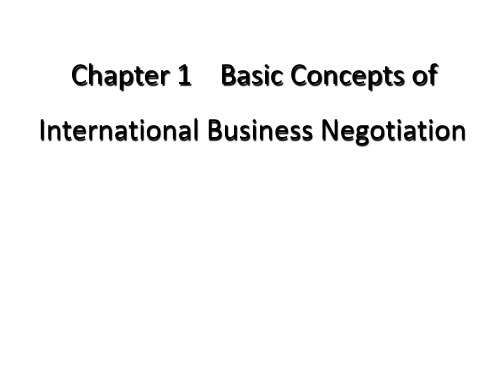
(2)According to the textbook, what is negotiation? In simplest terms, negotiation is a discussion
between two or more disputants who are trying to work out a solution to their problem. Negotiation is a mean of dealing with human relationship and resolving conflicts.
2 negotiation takes place between two or more people;
3 negotiation is used to solve problem or conflicts;
4 people negotiate each other in order to achieve their own aim.
Section Ⅰ
2.The Correct Understanding of Negotiation
(1)What is the conflict of negotiations?
A conflict is a dispute, disagreement or argument between two or more interdependent parties who have different and common interests. A conflict can block each other’s ability to satisfy their interest.
Definition and Characteristics of Business Negotiation
商务英语谈判chapter 1
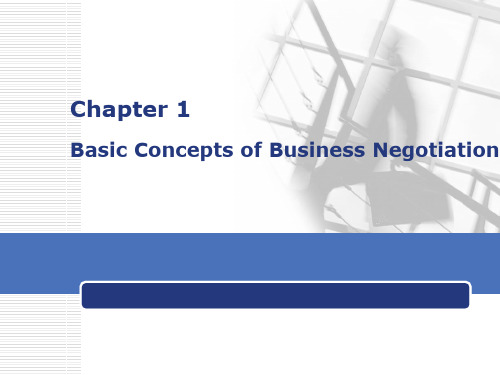
Elements of Business Negotiation contain: It is an element of human behavior and depends on communication It takes place only over negotiable issues It takes place only between people who have the same interest It takes place only when negotiators are interested not only in taking but also in giving It takes place only when negotiating parties trust each other to some extent
1. Motivation of Business Negotiation
Why do human beings negotiate? Economics: to study alternative way to use scarce and limited but productive resources to produce goods and services to satisfy man’s unlimited demand. Conflicts
Basic questions in the negotiation
Why they negotiate; Who they negotiate with; What they negotiate about; Where they negotiate; When they negotiate; How they negotiate.
国际商务谈判(英文)Unit 01 Making an Enquiry[精]
![国际商务谈判(英文)Unit 01 Making an Enquiry[精]](https://img.taocdn.com/s3/m/442646e7360cba1aa811da8f.png)
Making an Enquiry
Unit 1 Making an Enquiry
Introduction
An enquiry means to enquire about the terms and conditions of a transaction.In oral business negotiation, both the sellers and the buyers can make an enquiry.An enquiry is not only one of the most direct ways to get details about a product,but also an important beginning step in a business negotiation.
The more information you obtain,the more benefits you can get from the negotiation.
Unit 1 Making an Enquiry
Objectives
Know the important role in a business negotiation; Know how to make oral enquiries and the tactics of making proper enquiries; Have some knowledge of the information covered in different enquiries; Have a good command of words and expressions related to enquiry.
Unit 1 Making an Enquiry
Chapter1BusinessNegotiation商务谈判

Chapter 1 Business Negotiation
1.Some Basic Concepts of Negotiation
(1)The Concept of Negotiation A negotiation is a process of communication between parties
• 2.The Forms of Business Negotiation
Chapter 1 Business Negotiation
3.The Overall Framework of International Business Negotiation
Background Atmosphere Factors
1)the best target; 2)the intermediate target; 3)the acceptable target.
Chapter 1 Business Negotiation
• 5.Basic Rules of International Business Negotiation
• 1.Some Basic Conceots of Negotiation • 2.The Forms of Business Negotiation • 3.The Overall Framework of International Business
Negotiation • 4.Features of International Business Negotiation • 5.Basic Rules of International Business Negotiation • 6.The General Producer of International Negotiation • munication Skills for Negotiations • 8.Types of Negotiation Styles • 9.The Business Contract
商务英语谈判
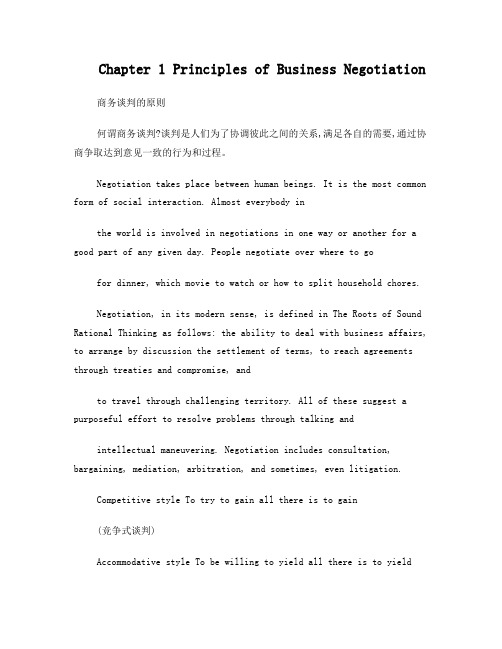
Chapter 1 Principles of Business Negotiation商务谈判的原则何谓商务谈判?谈判是人们为了协调彼此之间的关系,满足各自的需要,通过协商争取达到意见一致的行为和过程。
Negotiation takes place between human beings. It is the most common form of social interaction. Almost everybody inthe world is involved in negotiations in one way or another for a good part of any given day. People negotiate over where to gofor dinner, which movie to watch or how to split household chores.Negotiation, in its modern sense, is defined in The Roots of Sound Rational Thinking as follows: the ability to deal with business affairs, to arrange by discussion the settlement of terms, to reach agreements through treaties and compromise, andto travel through challenging territory. All of these suggest a purposeful effort to resolve problems through talking andintellectual maneuvering. Negotiation includes consultation, bargaining, mediation, arbitration, and sometimes, even litigation.Competitive style To try to gain all there is to gain(竞争式谈判)Accommodative style To be willing to yield all there is to yield(通融式谈判)Avoidance style To try to stay out of negotiation(回避式谈判)Compromising style To try to split the difference or find (妥协式谈判) an intermediate point according tosome principleCollaborative style To try to find the maximum possible (合作式谈判) gain forboth parties----by carefulexploration of the interests of allparties----and often by enlarging the pieVengeful style To try to harm the other(报复式谈判)Self-inflicting style To act so as to harm oneself(自损式谈判)Vengeful and self-inflicting style To try to harm the other andalso(报复和自损式谈判) oneselfPeople who go for the competitive style are known as hard-bargaining negotiators. They start off with outrageous demands, using threats and other tactics to get what they want. One side typically starts out high and the other low. Afterseveral rounds of offer and counter-offer, the negotiators end up “spl itting the difference”. In this form, negotiation is viewed asa game where each side tries to get the best deal for themselves. Neither side exhibits concern for the other side.1.1Principle of Collaborative Negotiation合作式谈判的原则Ⅰ. Collaborative NegotiationNegotiation can also assume the form of collaborative style. It involves people with diverse interests working togetherto achieve mutually satisfying outcomes. Collaborative negotiation is known by many names. Some popular names include “problem-solving negotiation”, “consensus-building negotiation”, “interest-based negotiatio n”, “win-win negotiation”, “mutualgains negotiation”, and so on.The goal of collaborative negotiation is to manage the dispute so that the outcome is more constructive than destructive. A destructive outcome results in damages and involves exploitation and coercion. Aconstructive outcome fosters communication, problem-solving, andimproved relationships.● The negotiation parties have both diverse and common interests.● The common interests are valued and sought.● The negotiation process can result in both parties gaining something.● The negotiating arena is controlled by enlightened self-interest.● Interdependence is recognized and enhanced.● Limited resources do exist, but they can usually be expanded through cooperation and creativity.● The goal is a mutually agreeable solution that is fair to all parties and effective for the community/group.The collaborative negotiation focuses on interests rather positions. Integrative solutions are obtained by understandingother’s self-interests, not by jostling for positions.The collaborative negotiation places value on relationship. It requires trust and relies on full disclosure of relevant information.The disadvantages of this approach are:●It may pressure an individual to c ompromise and accommodate inways not in his best interest.●It avoids confrontational strategies, which can be helpful at times.●It increases vulnerability to deception and manipulation by a competitive opponent.●It makes it hard to establish defi nite aspiration levels and bottom lines.●It requires substantial skill and knowledge of the process.●It requires strong confidence in one’s perceptions regarding the interests and needs of the other side.Ⅱ. Principled NegotiationIn this form, each side of the negotiating parties attempt to meet the other side’s interest as well as their own. By thoroughly understanding their own interest as well as the other’s, both sides are often able to arrive at solutions neither alone could have envisioned or made possible. In this type of negotiation, each side recognizes and accepts the legitimate interests of the other side and they are committed to dealing with differences constructively in order to advance their own self-interests. This has been called “collaborativeprincipled negotiation”, a concept set forth by Roger Fisher and William Ury in their book Getting to Yes: Negotiating Agreement Without Giving In.Principled negotiation is particularly oriented to collaborative negotiations. However, it can be used in competitive negotiations and inother aspects of conflict management. It is a method that is centered around four considerations (PIOC):● People: Separate the people from the problem.● Interests: Focus on interests, not positions (inte rests always underlie positions).● Options: Invent options for mutual gains.● Insist on using objective criteria.1.Separate the people from the problemFisher and Ury pointed out that “negotiators are people first”. There are always relational and substantive issues in negotiation. The relational issue tends to become entangled with the problem and the positional bargaining puts relational and substantive issues in conflict with each other. Fisher and Ury suggested that the negotiators separate the relationship from the substance and deal directly with the people problem.It is a feasible to deal with a substantive problem and maintain a good working relationship between negotiating parties. People problems are usually caused by inaccurate perception, inappropriate emotions and poor communication. In order to deal with those problems, three techniques are recommended for both parties to follow:A.Establish an accurate perception.●Conflict, very often, is not caused by what happens, but by ho w people perceive what happens.●Increase the capability of each party to see the other side’s point of view (for example, by reversing roles).●Avoid blaming the other party for your problems.●Discuss each other’s perceptions of the problem.●Get the other party to participate in the mutual activities.●Seek to make negotiation proposals consistent with the other party’s values.B.Cultivate appropriate emotion.●Your emotion affects that of the other party.●Recognize and understand emotio ns of both parties.●Make emotions explicit and legitimate.●Allow the other party to let off steam.●Stay calm with the other party’s emotional outbursts.C. Strive for better communication.● Negotiation is a process of communicating between pa rties for the purpose of reaching a joint decision.● Be an active listener and acknowledge what is being said.● Speak to be understood.● Avoid criticism that may hurt the other party’s feelings.● Speak for a purpose.2. Focus on interests, not positionsIn such a case, negotiators need to distinguish between interests and positions and focus on interests not positions. A position is what you want or must have. An interest is why you want what you want.Positions can be thought of as a one-dimensional point in a spaceof infinite possible solutions. Positions are symbolic representations of a participant’s underlying motivating interests. In negotiation, there are many kinds of interests: multiple interests, shared interests, compatible interests and conflicting interests. Indentifying shared and compatible interests as “common ground” can be helpful in establishing a found for additional discussions. “Easy points of agreement”can be indentified and the principles underlying those easy points of agreement can often be extrapolated to help resolve other issues. Methods for focusing on interests instead of positions are as follows:A. Identify the self-interests.● Explore and recognize the interests of the other party that stand in your way.● Examine the different interests of different people on the other side.● Respect your counterparty as human beings and recognize the needs and interests that underlie their positions.B. Discuss interests with the other party.●Give your int erests a vivid description. Be specific.●Demonstrate your understanding of the other party’s interests and acknowledge them as part of the overall problemthat you are trying to solve.●Discuss the problems before proposing a solution.●Direct the discussion to the present and the future. Stay away from the difficulties of the past.●Be hard on the problem but soft on the people.3.Invent options for mutual gainsHere are the steps for overcoming the obstacles and developing multiple solution options:A.Separate the act of inventing options from the act of judging them.●Run a brainstorming session.☆Before brainstorming:■Define your propose----what you would like to achieve at meeting.■Choose a few participant (between five and ei ght people)■Change the environment----select a time and place distinguishing the session from regular discussions.■Design an informal atmosphere----talking over a drink, meeting at a vacation lodge or any other forms that make participants feel relaxed.■Choose a facilitator----a facilitator is needed to keep the meeting on track, make sure everyone gets a chance to speak, and stimulate discussion by asking questions.☆During brainstorming:■Seat the participants side by side facing the problem.■Clarify the ground rules, including the no-criticism rule.■Brainstorm.■Record the idea in full view.☆After brainstorm:■Check the most promising ideas----mark those ideas that participants think are the best.■Explore improvements for prom ising ideas----take one promising idea and explore ways to make it better and practical.■Set up a time to evaluate ideas and make a decision.●Consider brainstorming with the other side; it can be very valuable.B.Develop as many options as possible before choosing one.●Adopt the four types of thinking in generating options.●Look at the problem through the eyes of different experts.●Develop different versions of agreement.●Change the scope of a proposed agreement----break the problem into smaller units.C.Search for mutual gains.●Identify shared interests.●Dovetail differing interests.4.Insist on using objective criteriaThe guidelines for objective criteria are:●Independent of wills of all parties.●Legitimate and practi cal.●Acceptable to all parties.After identifying objective criteria and procedures, it is time to discuss them with the other party. There are three basic points to remember:A.Frame each issue as a joint search for objective criteria.B.Reason and be open to reason as to which standards are most appropriate and how they should be applied.C.Never yield to pressure, only to principle----yield to an argument or presentation that is based on reason and principle,not to one based on pressure.1.2Principle of Interest Distribution利益分配原则In negotiations at the domestic level, there are two types of interests involved: personal and organizational; at the international level, there are three: personal, organizational and national.Organizational RolesPrinciples and Agents1.3Principle of Trust in Negotiation信任的原则Trust is something of great importance in negotiation. Professor Richard C. Reuben defined it as “a state involving expectations about another’s motives and actions with re spect to oneself in situations entailing risk of uncertainty”. In the outline of his Negotiation----Law 5810, he states that there are three types of trust in professional relationships:●Deterrence-based trust (威慑型信任)☆ Calculus-based trust (预计型信任)●Knowledge-based trust (了解型信任)●Identification-based trust (识别型信任)Ⅰ. Trust Building in Negotiation1.Speak their language2.Manage your reputation3.Make dependence a factor4.Make unilateral concessions your concessions6.Explain your demandsIn their book entitled The Only Negotiating Guide You Will Ever Need, Peter B. Stark and Jane Flaherty list fifteen things that a negotiator can do to build trust with his counterpart.1.Demonstrate your competence2.Make sure the nonverbal signals you are sending match the words you are saying3.Maintain a professional appearancemunicate your good intentions5.Do what you say you are going to do6.Go beyond the conventional relationship7.Listen8.Over-communicate9.Discuss the indiscussibles10.Provide accurate information, without any hidden agenda11.Be honest----even when it costs you something12.Be patient13.Uphold fairness14.Negotiate for abundance, not scarcity15.Take calculated risksⅡ. Maximiz ing Joint Gain1.4Principle of Distributive, Integrative & Complex Negotiation两分法谈判、双赢谈判和复杂谈判的原则Ⅰ. Distributive NegotiationJennifer E. Beer listed a set of distributive bargaining strategies in Culture at work:1.Preparation2.Opening offers3.Exchange information and arguments4.Concessions and decisionsⅡ. Integrative Negotiation。
商务英语谈判 unit 1

Part Three
Public Speaking in Business
Getting to Know Public Speaking
Strategies for Becoming a Better Speaker
Make sure that you plan your communication appropriately
Give your opinion and give mean.
Try to give more than just the basic answer.
You are being tested on your English, not your knowledge of business.
Unit 1 Dream Job
Part One
Situational Practice
Meeting at the Airport
You are the secretary in ABC Company. You are going to meet an important customer of your company, Mr. White from America. You identify yourself, greet him and start an informal talk about his flight and the weather in your city.
Step 3: Deliver your talk in the class.
Part Four
BEC Focus
Part
Speaking task
Grouping
Length
Talking about yourself and expressing One One –to –one About 3 minutes opinions One-minute presentation on a business theme (choice of three) followed by questions from other candidates Discussion of a business scenario from prompts Individual and About 6 minutes pairwork
第一章商务英语口译商务谈判

第八页,共41页
Sight Interpretation (Dialogue 2)
季节性的商品:a seasonal product; 货物投放市场:put the goods on the market;
适时交货:a timely delivery; 早点交货:make an earlier delivery; 分批装运:partial shipment
four stages: inquiry, offer, counter-offer and acceptance
five items:
1. the subject matter of the contract;
2. the price of the goods;
3. the liabilities of the seller; 4. the liabilities of the buyer; 5. the methods
分批装运:partial shipment; 遵守合同:observe the contract; 终止合同:cancel the contract;
商业信誉:commercial integrity;
守信用:maintain commercial integrity; 约束力:binding;
;
第六页,共41页
retract the order: 撤回订单;
建议:注意付款方式应该尽量掌控主动权,可以适当的 妥协,但是一定要坚持必要的底线,避免后期收不回货 款的风险。
第十页,共41页
Note-taking (2)
报价:selling offer; 还价:counter-offer; 平等互利的基础:the basis of equality and mutual benefit; 破例减价10% :10 percent as a special accommodation;
商务英语谈判和会话unit1new

Questions that suggest an answer or bias the response in a specific direction
Perception skills
Logical arguments
Presenting facts, statistics, and evidence to support one's position
Negotiating differences
Resolving differences and negotiating solutions to problems
Phase of achieving an agreement
Summarizing the negotiation results
Summarizing the main points of the negotiation and highlighting the key issues
Start stage
Greeting and introduction
01
Expressing greetings and introducing one self
and the other party
Outlining the negotiation agenda
02
Briefly introducing the topics and objectives of
Open and Honey Communication
Use open and honey language to discover your ideas and positions, while examining the other party's views
商务英语谈判chapter 1

Settlement
• Military method • Peaceful method——Negotiation
2. Implications of Business Negotiation Business negotiation is a bargaining situation in which two or more players have a common interest to cooperate, but at the same time have conflicting interests over exactly how to share.
Basic questions in the negotiation Why they negotiate; Who they negotiate with; What they negotiate about; Where they negotiate; When they negotiate; How they negotiate.
Chapter 1
Basic Concepts of Business Negotiation
Contents
1. Motivation of Business Negotiation 2. Implications of Business Negotiation 3. Elements of Business Negotiation 4. Characteristics of Business Negotiation 5. Types of negotiation
Distributive
- 1、下载文档前请自行甄别文档内容的完整性,平台不提供额外的编辑、内容补充、找答案等附加服务。
- 2、"仅部分预览"的文档,不可在线预览部分如存在完整性等问题,可反馈申请退款(可完整预览的文档不适用该条件!)。
- 3、如文档侵犯您的权益,请联系客服反馈,我们会尽快为您处理(人工客服工作时间:9:00-18:30)。
外语教学与研究出版社
Case One
一个被单独囚禁的囚犯整日无所事事。一 天,他忽然闻到一种万宝路的香烟味道。他很喜欢这 种牌子的烟。原来门廊的卫兵正在吸烟,钩起了他的 烟瘾。他用手指轻轻的敲了敲门。卫兵走过来傲慢的 说:“你要干什么?”囚犯答道:“请给我一只烟, 就是你抽得那种万宝路。”卫兵感到很惊异,囚犯还 要抽烟,真是异想天开。他嘲弄的哼了一声,就转身 走开了。
安排:
1. 教材共七章,每章结束后布置书面作业一份。 2. 每章中小节后的练习要求学生作为课后练习,自 觉完成。 3. 每位同学准备一个谈判案例并进行技巧分析,在 每次上课时进行课堂演示。
外语教学与研究出版社
成绩构成
期末成绩占60%A 平时成绩占40%
章节书面作业60% 课堂案例演示20% 课堂纪律10% 课堂问答10%
for some purpose:
motive of negotiation
between two or more parties:
1. there is something you want from others 2. a process of information transfer 3. unpredictability of the result
The result is based on free will of the parties:
the art of persuasion
外语教学与研究出版社
Motive of Negotiation
Needs and wants are the motive for negotiation.
Is this a negotiation? Is this a successful negotiation?
外语教学与研究出版社
Case One-Further Story
囚犯又用手敲了敲门,这次他态度威严。那个士兵 吐出一口烟雾,恼怒的扭过头问:“你又想干什么?”囚犯 回答:“对不起,请你在30秒之内给我一只烟;否则我就用 头撞着混凝土墙,直到撞得自己血肉模糊,失去知觉为止。 当我醒来时,我就说是你干的。也可能当局不相信我。但是 ,你必须出席每一次听证会,不断证明你是无辜的,你必须 填写各种报告——所有这些都是因为你拒绝我一只劣质的万 宝路!就一只烟,我保证不再给您添麻烦了。” 结果卫兵从 小窗里给他递了一只烟,并替他点上。
Is this a successful negotiation for the prisoner? How did the prisoner achieve his purpose through negotiation?
外语教学与研究出版社
Features of Negotiation
Negotiation is
Three essential points
Interdependent parties (relationship developed by interrelated interest) Both common and different interests Fight for one’s own interests
Conflict occurs when two or more people compete over limited resources.
What is conflict?
外语教学与研究出版社
Conflict
A Conflict is a dispute, disagreement or argument between two or more interdependent parties who have different and common interest.
外语教学与研究出版社
Ca了解到事态的发展过程,发现建筑商获得法国 新闻界的支持,许多报纸公开报道并夸大宣传 此事,一时间满城风雨。令迪斯尼公司更感到 威胁的是,对方决定在主题公园的盛大开张日 举行示威游行。认识到自己处于一个无法取胜 的境况之后,迪斯尼公司立刻转变态度,声称 将与对方全面协商,并很快付清了工人工资。
外语教学与研究出版社
Definitions of Negotiation (Cont.)
Negotiation is the process we use to satisfy our needs when someone else controls what we want. Whenever people exchange ideas with the intention of changing relationships, whenever they confer for agreement, then they are negotiating.
外语教学与研究出版社
Case Two
世界著名的迪斯尼公司在20世纪90年 代遇到这样一件事情。公司耗资50亿美元在巴 黎附近兴建的主题公园准备于1992年4月12日开 张,工程结束前,建筑承包商却要求迪斯尼公 司为工人的额外劳动追加近150万美元的工资。 建筑承包商之所以在当时要钱,其奥秘不言自 明。欧洲迪斯尼总经理称这一要求为敲诈,完 全不与理会。
Fundamental Reason
Fundamental reason: scarce resources
Why did Israel negotiate with Egypt? Why does foreign company negotiate over investment or cooperation contract with local Chinese companies? Why do people trade? Why do employees negotiate over salary with the boss?
How is this principle reflected in the case?
外语教学与研究出版社
Stakes
Stakes are the values that may be gained or lost, and costs that may be incurred or avoided.
外语教学与研究出版社
Disputable interests
Negotiating parties will either gain the interests they expect to win from the negotiation or lose what they hope to attain, which indicates that the talks are pertinent to relevant parties’ own affairs and interests. Only when a party has stakes connected with the issues to be talked, can it become actively engaged in the negotiation. 外语教学与研究出版社
外语教学与研究出版社
Information transfer
Negotiation is based on the information flow between two or more parties.
The
information gap and unpredictability of the other party makes negotiation possible. So information is an essential element in the success of negotiation.
外语教学与研究出版社
Analysis of Case Two:
1. The two parties inform each other of their actions and reactions, which makes negotiation proceed. 2. The construction company gets the essential information: the opening date of the Disney Park. 3. Information transfer method: the use of information broadcasting to the mass adds danger for Disney on the one hand and makes Disney believe in his determination to arrange a strike on the other hand.
No free lunch
In order to get what is desired, both parties have to pay for the gaining at either high cost or low cost depending on how well negotiators manage the situation.
Needs from the other is the motive of negotiation. The more your opponent wants from you, the more likely you will succeed.
Analysis of Case One:
Initially, the need for a cigarette urged the prisoner to negotiate, but the guard has no need from the prisoner, so he refused to negotiate. In order to achieve his purpose, the 外语教学与研究出版社 prisoner created a need for the guard to
